 It’s no secret that most people use many email addresses. So just how many email addresses does the typical person have on average?
It’s no secret that most people use many email addresses. So just how many email addresses does the typical person have on average?
The Radicati email statistics report tells us part of the story.
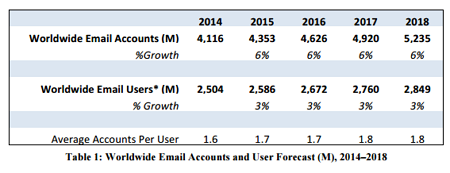
On average people have just less than two email accounts each, more often than not a primary address which is regularly checked and secondary address.
The email address has become central to life in the online world. Booking flights, buying goods, using social networks, getting bank, saving and investment statements, job applications are just a few of the services that need an email address. Try naming one that doesn’t!
Data from the DMA shows that 51% of people now have held the same email address for over 10 years. Remember that email is still not old, Hotmail only launched 19 years ago.
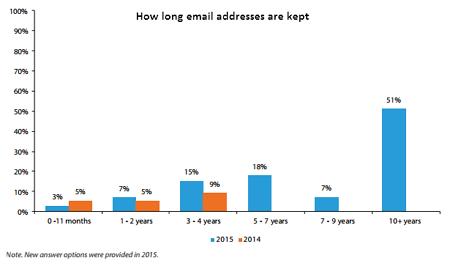
Because of the pain of updating many online accounts there is huge inertia to changing that primary address. I believe that the length that a primary email address is held for will continue to increase.
DMA data from 2019 shows the average number of email addresses owned by consumers is 2.5 and that includes working people that have business email addresses:
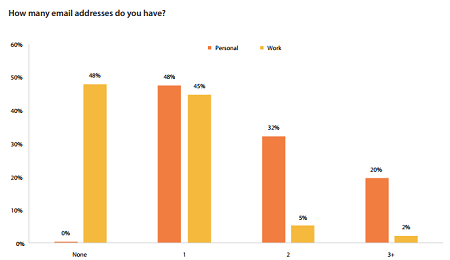
The difference in value of a primary and secondary address
How concerned should email marketers be about the address they collect? What is the exact difference in value between a primary and secondary address?
Return Path looked at inbox behaviour data from 600,000 email accounts. Based on the type of usage inboxes were classified into primary, secondary and dead. This graphic shows the difference in read rates for different types of account:
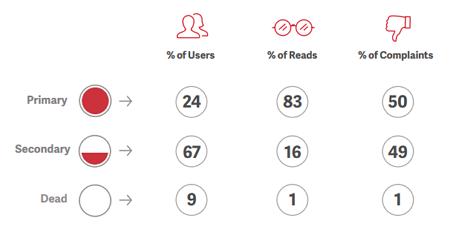
It might look dramatic enough that 83% of reads on a list come from primary email addresses but now factor in that primary addresses make up only 24% of the list vs 67% for secondary.
After adjusting for this difference it means primary addresses are just over 14 times more likely to read an email than a secondary. The primary email address is hugely valuable.
The DMA consumer email tracking report from 2019 also tells us something about the decision as to which email address to share with a brand.
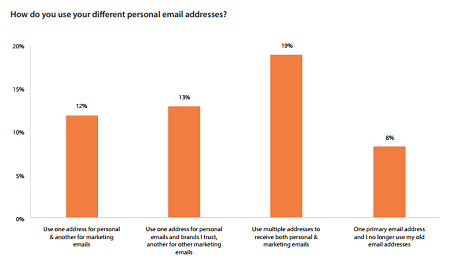
The good news is that consumers are more willing than ever to share their primary email address with brands they trust.
That last word, trust, is key. The report shows that the number one thing to getting a quality email address is trust.
If your brand is a household name that is generally well trusted you are in a good position. For smaller brands the trust engendered by your website is important.
A good start is to be transparent about data collection and provide clarity. Don’t trick the opt-in by trying to hide away a tick box or using a confusing opt-in statement.
Also using trust indicators and social proof, such testimonials from well-known brands or influencers can help borrow trust when your brand is not a household name. Check out these practical ideas on use of social proof as part of the sign up.
The decision to sign up is has an associated positive and negative emotion
- Desire for the incentive being offered
- Fear of losing control of their email address
To increase signups and the number of quality primary email addresses a strong incentive is needed along with relieving the anxiety felt when sharing an email address.
Content Verve ran different tests around reducing anxiety. Adding ‘We guarantee 100% privacy. Your information will not be shared’ increased signups 19.47%.

This wasn’t the only statement tested and the results are surprising. Using ‘100% privacy – we will never spam you!’ reduced signups 18.7%.
Possibly using the word spam was enough to awaken fear about this happening or perhaps it addresses the wrong fear. That consumers are not worried about email from the brand of signup but concerned as to the email address leaking out to other brands. The typical marketing euphemism for this being we share data with our selected trusted partners.
Now, really, honestly, I absolutely respect privacy and don’t share hard won email contact details. With brands on the list already including eBay, The Guardian, Sporting Bet and Go Compare, shouldn’t you join them below?
